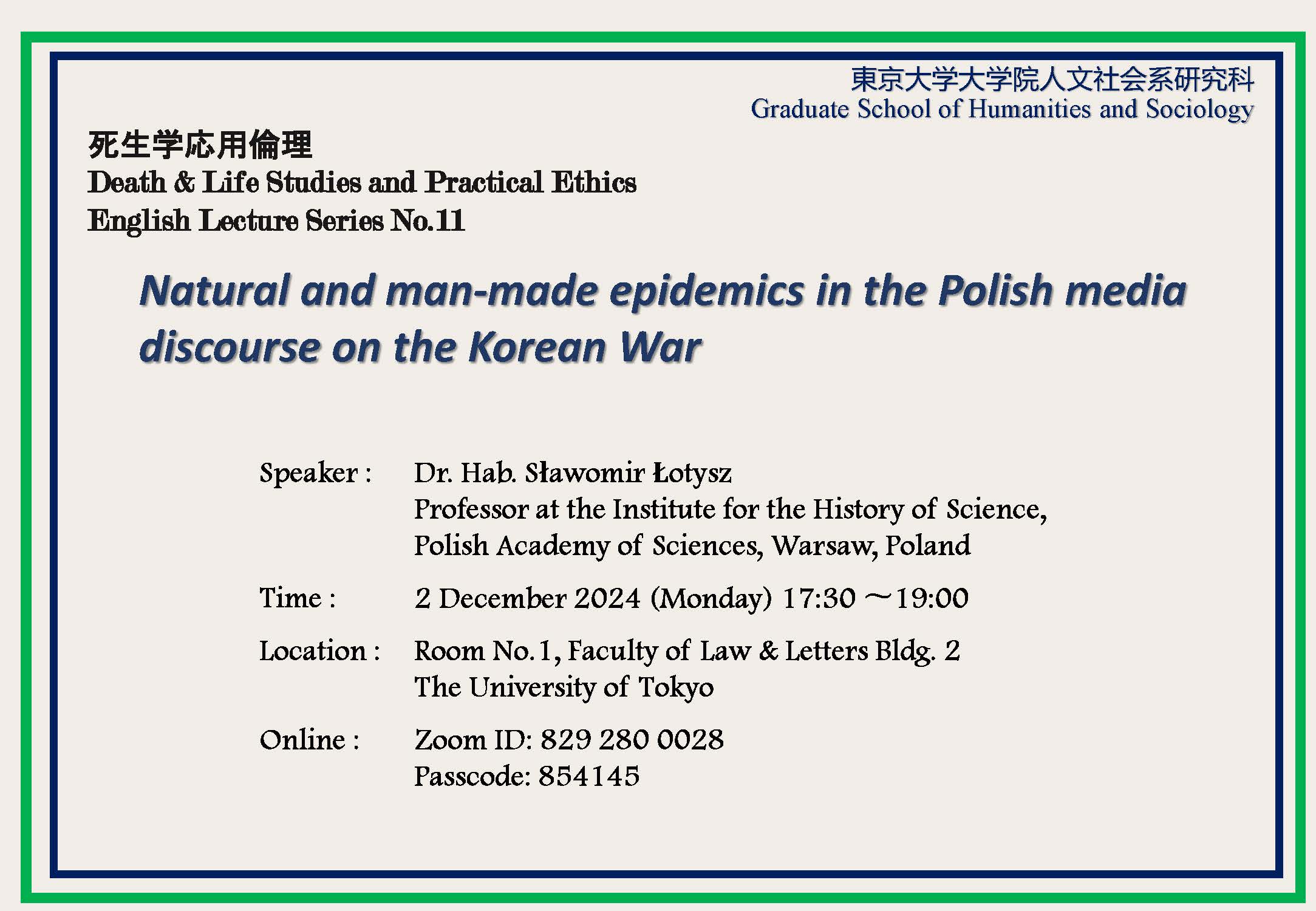Death & Life Studies and Practical Ethics Lecture Series
Number 011
Dr. Hab. Sławomir Łotysz, "Natural and man-made epidemics in the Polish media discourse on the Korean War"
【日時】2024年12月2日(月)17:30-19:00
【会場】 東京大学本郷キャンパス 法文2号館2階1番大教室
【オンライン会場】Zoom ID: 829 280 0028 (Passcode: 854145)
【参加について】参加無料・事前予約不要
【使用言語】英語(通訳なし)
【主催】東京大学大学院人文社会系研究科 死生学応用倫理研究室
【共催】東京大学人文社会系研究科
【助成】布施学術基金
※この講演会は布施学術基金により助成を受けています。
【Speaker】
Sławomir Łotysz is Professor at the Institute of the History of Science, Polish Academy of Sciences, Warsaw, Poland. His research interests include the history of technology, disability studies, environmental history and health diplomacy. His recent publications include an award-winning book The Pripet Marshes. Nature, Knowledge and Politics in Polish Polesie until 1945 (in Polish: Pińskie błota. Natura, wiedza i polityka na polskim Polesiu do 1945 roku, Krakow: Universitas 2022), and Factories as Aid. Penicillin behind the Iron Curtain, 1945-54 (in Polish: Fabryka z darów. Penicylina za żelazną kurtyną 1945-1954, Warsaw: Aspra 2020). In 2014-15 he was an Andrew Mellon Fellow at the Netherlands Institute for Advanced Studies in Wassenaar, the Netherlands. In 2017-21 he was President of the International Committee for the History of Technology. He is currently the Project Leader of “Media and Epidemics. Technologies of Science Communication and Public Health in the 20th and 21st Centuries”, funded within the international CHANSE network.
【Abstract】
In the Korean War, communist Poland sided with the aggressor, the Democratic People's Republic of Korea. In addition to supplying arms and economic aid, Poland provided humanitarian and medical assistance. The situation in Korea, previously virtually unknown to Poles, became the number one topic in the Polish media for several years, with public health issues occupying a significant share of the news.
The paper examines the various, sometimes less obvious, implications of the health and medical dimension of this war for Polish public discourse. This concerns primarily the alleged use of bacteriological weapons by US army supporting South Korean forces against communist aggression from the North. Polish propaganda repeated this allegation, enlisted domestic scientific and medical experts to support it, and used the visual rhetoric of editorial cartoons in daily newspapers for the same purpose. Part of this propaganda effort was a Polish novel, Bacteria 0.78 by Marian Bielicki, inspired by Japanese experiments with germ warfare in northern China during the Second World War. The book, originally published in 1951, depicted US preparations to use the results of Japanese experiments in a future war against the Communist bloc. The novel's propaganda value in the anti-American campaign was quickly recognised throughout the Communist bloc, and it was translated into Russian, Chinese and Korean, among other languages.
In contrast to these heavily ideological narratives is the expert narrative by the Polish doctors who set up and ran a hospital in North Korea at the end of the war. This was a site of mutual exchange of medical knowledge, where Poles learned about health conditions previously unknown to them, and Koreans learned about the practices of Western medicine.
Using mainly untapped sources, this presentation looks at three aspects: the visual rhetoric of the cartoons, the literary message of the Polish novel and the background to the publication of its Korean translation, and finally the medical significance of the accounts of doctors working in a Polish hospital in Korea.


